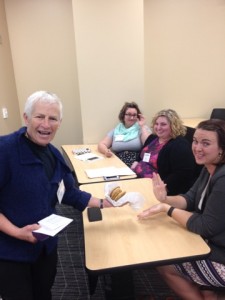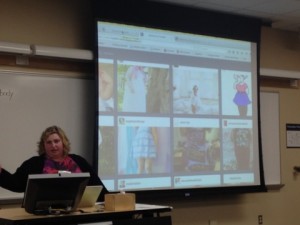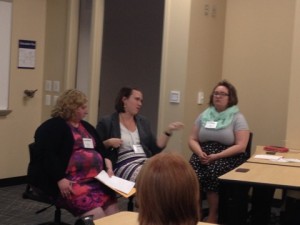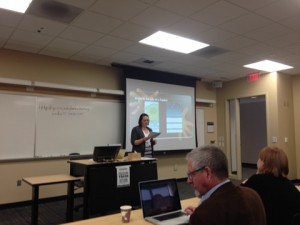Panelists
Kaitlin Clinnin, Ohio State University
Katie DeLuca, Ohio State University
Katie Manthey, Michigan State University
Review
As this was my first Computers and Writing Conference, I had no idea of the intimacy of the panels and the continuing conversations that started at breakfast, lunch, and throughout the day, carrying from one panel’s Q & A to another. However, I did notice something a little different about this panel. I had already identified it as a must-see for the conference, but there were other good omens. One, the room was packed. Two, as I was starting to see about this conference, those in attendance were from all levels of academia, which not only indicated the collegiality of this conference, but also that this topic was very pertinent to many facets of the academic and personal experience. Three, there were cookies.
When Cin dy Selfe shows up to your panel at #cwcon, you must be doing something right.
dy Selfe shows up to your panel at #cwcon, you must be doing something right.
But seriously, this panel of three women examining the bodily connections they have to rhetoric hit a particular vein of research that is actively growing and gaining attention: what are the connections between our body, health, privilege, and technology? Each presenter examined these questions in detail, and engaged the audience to actively reflect on these question for their own bodily experiences. While this isn’t a new trend within rhetorical studies, bodily scholarship has become a major focus of upcoming scholars, and these three women took on the subject with skill, rhetorical awareness, and passion.
My #cwcon #c5 slides on Righting/Writing the Body: Narratives + Literacies of the Body through Personal Tracking: http://t.co/StlDMYWhE2
— Dr. Kaitlin Clinnin (@kclinnin) May 29, 2015
Kaitlin Clinnin’s analysis of the technological and bodily implications of personal tracking challenged perceptions of our own needs and desires through the use of FitBit. Glancing around the room, and on Clinnin’s on wrist were FitBits of many colors. The visual representations of our bodies on the FitBit seem to override our own bodily awareness; these apps are built on achievement, and the categories of progress are determined by the app. Clinnin’s acknowledgement of her own investment in the app not only showed our need to track progress, but also our need to be told the right way to understand our bodies. Of course, technology tells us we need it to interpret this data, as if it is more of an expert on our bodies than we are. But what made this presentation distinctive was the separation of the body and mind; by using technology to inform us about our body, health, and fitness, the FitBit overrides feelings or instincts we have connected to our bodies, thereby increasing and even encouraging our body-mind split. Clinnin identified the theme for this panel; what happens when technology and digital spaces interfere with or even separate our body from our minds?
#Fatshion, #Fatspo, and Haters: Examining Rhetorical Safe Spaces
 Katie DeLuca examined the tumblr communities that are safe spaces for fat bodies and their celebrations, but showed how these spaces still attract trolls and haters. She asked, “What if we engage with the haters in rhetorical safe spaces?” DeLuca showed that through the links of hashtags and followers, tumblr users can create rhetorical spaces where people can engage and take risks together.
Katie DeLuca examined the tumblr communities that are safe spaces for fat bodies and their celebrations, but showed how these spaces still attract trolls and haters. She asked, “What if we engage with the haters in rhetorical safe spaces?” DeLuca showed that through the links of hashtags and followers, tumblr users can create rhetorical spaces where people can engage and take risks together.
By making posts with tags, they create a user community and interpolate themselves into affinity groups. -DeLuca
As with the FitBit, these communities are criticized through shaming rhetorics. “Concerned trolls” comment on these posts to let fat people know they are going to die (from causes related to their fat) someday. While this is a different tactic of trolling, the effect is the same: bodily criticism from disembodied voices telling people what they should be doing about their health and size. Throughout her presentation, DeLuca showed these communities with pictures of beautiful men and women of many shapes and sizes, all who have been criticized and told that “obesity is an epidemic, not a body type.”, At the end of DeLuca’s presentation, the next presenter, Katie Manthey, commented that “We read bodies subconsciously, but we need to read bodies ethically.” In response, DeLuca encouraged us to teach our students about the acts of trolling based on these bodily readings, and to teach them to “avoid becoming trolls, and think of the other.”
Finally, Katie Manthey, a Jezebel-published fat studies scholar, presented on the ideas and perceptions between “Fat” and “Obese.”
https://twitter.com/rachelbigeyes/status/604365019728449537
Manthey started her presentation by challenging the audience to ask how they perceive their own bodies. She asked the audience if they had fat on their bodies, and then if people considered themselves “fat.” While the whole audience acknowledged that they have fat, not everyone labeled themselves as “fat.” By pointing out the complex perceptions of having versus being fat, Manthey challenged the audiences’ perceptions of what it means to be fat, and where the authority to label a body as fat resides.
Technology gets away from intuitive practices.We are more than our data.. -Manthey
Manthey identified that our ideas about fat are centered in Western, white, able-bodied, and cis-gendered frameworks, and obesity itself is a neoliberal construct. What challenges these perceptions, Manthey added, what the idea that someone can be fat as a conscious, ideological choice. What does that mean for frameworks? It means that insurance companies, governmental agencies, health professionals, the AMA, the BMI and others have defined and redefined their perceptions and qualifications of “fat,” and those changes have shifted not only the way we perceive fat bodies, but also who is labeled as obese and who is not. Manthey’s presentation not only clarified the fluid definitions of fat, but also their origins and the motivations behind these redefinitions and how it effects our identities. By labeling the the BMI, AMA, and other agencies as technologies, Manthey showed how they “need to address larger systemic issues around health as a neoliberal construct.”
 These panelists engaged the audience in a conversation about having technologies that are alternative to the FitBIt, how our bodily data is being used and who is profiting from it, and how we can get students to be aware and see what the powers that be are getting out of us. As with many panels, we were left with more questions than answers, but what made this panel significant was the honesty and personal engagement from the presenters. They embodied (pun intended) their own arguments, and left the audience with a challenge to actively question the technologies in their own lives, get back in touch with their bodies, and to encourage our students to be empathic, questioning, and engaged citizens.
These panelists engaged the audience in a conversation about having technologies that are alternative to the FitBIt, how our bodily data is being used and who is profiting from it, and how we can get students to be aware and see what the powers that be are getting out of us. As with many panels, we were left with more questions than answers, but what made this panel significant was the honesty and personal engagement from the presenters. They embodied (pun intended) their own arguments, and left the audience with a challenge to actively question the technologies in their own lives, get back in touch with their bodies, and to encourage our students to be empathic, questioning, and engaged citizens.

